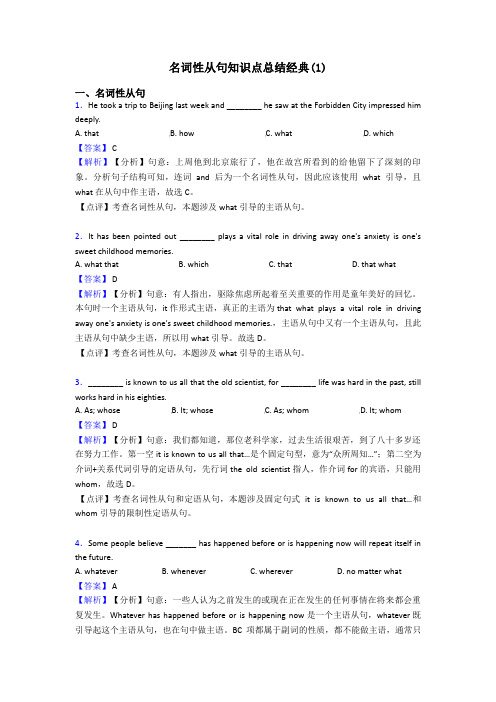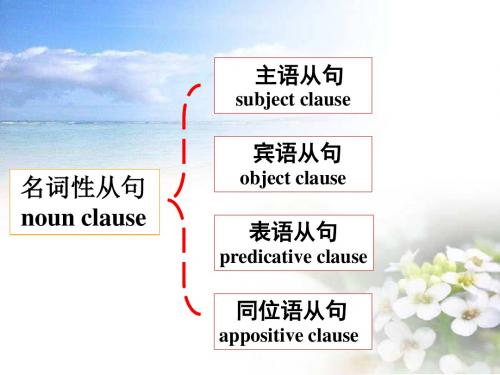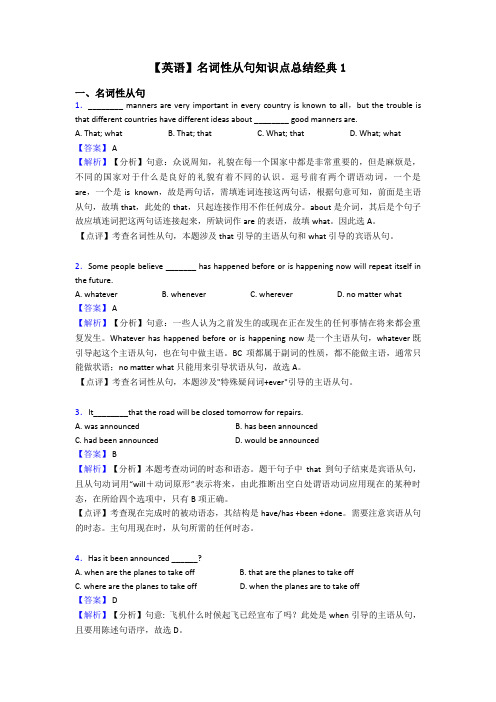名词性从句1
名词性从句知识点总结经典(1)

名词性从句知识点总结经典(1)一、名词性从句1.He took a trip to Beijing last week and ________ he saw at the Forbidden City impressed him deeply.A. thatB. howC. whatD. which【答案】 C【解析】【分析】句意:上周他到北京旅行了,他在故宫所看到的给他留下了深刻的印象。
分析句子结构可知,连词and后为一个名词性从句,因此应该使用what引导,且what在从句中作主语,故选C。
【点评】考查名词性从句,本题涉及what引导的主语从句。
2.It has been pointed out ________ plays a vital role in driving away one's anxiety is one's sweet childhood memories.A. what thatB. whichC. thatD. that what【答案】 D【解析】【分析】句意:有人指出,驱除焦虑所起着至关重要的作用是童年美好的回忆。
本句时一个主语从句,it作形式主语,真正的主语为that what plays a vital role in driving away one's anxiety is one's sweet childhood memories.,主语从句中又有一个主语从句,且此主语从句中缺少主语,所以用what引导。
故选D。
【点评】考查名词性从句,本题涉及what引导的主语从句。
3.________ is known to us all that the old scientist, for ________ life was hard in the past, still works hard in his eighties.A. As; whoseB. It; whoseC. As; whomD. It; whom【答案】 D【解析】【分析】句意:我们都知道,那位老科学家,过去生活很艰苦,到了八十多岁还在努力工作。
名词性从句讲义1

名词性从句讲义一. 名词性从句在句子中起名词性作用的从句叫做名词性从句(Noun Clauses). 名词性从句在句中的作用相当于名词或名词短语, 在复合句中担当主语, 宾语, 表语和同位语等. 因此根据它在句中不同的语法功能可分为: 主语从句, 宾语从句, 表语从句和同位语从句.引导名词性从句的连接词可分为三种:连接词: that, whether, if (不在从句中做任何成分)连接代词: what, who, whom, which, whose和wh+ever (通常在从句中做主语,宾语,表语等) 连接副词: when, where, why, how以及wh/h+ever(通常在从句中做状语)二.主语从句1.概念: 主语从句是在复合句中充当主语的从句.2.连接词:that只起连接主句和从句的作用,在从句中不担任任何成分,本身没有词义,不可省略whether 连接主句和从句, 在从句中不担任任何成分, 但本身有选择或是否的含义whether与if 区别〔一〕引导宾语从句,一般既可用whether 也可用if。
但1 or not放在whether之后时,只能用whether 不用if。
I don’t know whether or not he will come. 我不知道他是不是回来。
注1:如果or not放在whether所引导的从句句尾,那么可以用if来替换。
I don’t know whether/if he will come or not.我不知道他是不是回来。
2 在强调任意选择时,用whether…or,此时不用if替换whether。
He asked me whether I wanted to go there by train or by bus.他问我是想乘火车还是坐公共汽车去那里。
注:whether和or一起还有“不管〞之意,引导让步状语从句。
Whether he drives or takes the train, he will be here on time.不管开车来还是乘火车来,他都会准时到。
高中英语语法之名词性从句-(1)

5. “疑问词+ever” whatever, whichever, whoever, whomever 引导宾语从句 I’ll show you whatever you want to see. He likes to makes friends with whoever shares his interest.
二、注意正确使用时态
1. 如果主句是一般现在时、一般将来时或祈使句时,宾 语从句时态不受限制 I hear he is here today/ he was here yesterday/ he will be here tomorrow. 2. 如果主句是一般过去时,宾语从句应与主句保持一致, 即使用过去时态的某种形式。 He said he was watching TV/ he had swept the floor/ he would play football after school. 3. 如果宾语从句所叙述的是客观事实、自然现象、科学 真理等时,从句不受主句限制,用一般现在时。 Everyone answered there are sixty minutes in an hour.
• 2.引导主语从句的词: • 连词:that, whether
起连接作用不充当成分
• 连接代词:what(ever),who(ever), which(ever),whose,
充当主语/宾语/定语等
• 连接副词:when, where, how ,why
充当状语表时间、地点、方式、原因
连接副词:when, where, how ,why引导的主语从句
1.I hear (that)___________.(一小时后会回来)
2.He said (that)___________.(他非常想我们) 3.The teacher told us (that)_____________. (地球围绕太阳转)
【英语】名词性从句知识点总结经典1

【英语】名词性从句知识点总结经典1一、名词性从句1.________ manners are very important in every country is known to all,but the trouble is that different countries have different ideas about ________ good manners are.A. That; whatB. That; thatC. What; thatD. What; what【答案】 A【解析】【分析】句意:众说周知,礼貌在每一个国家中都是非常重要的,但是麻烦是,不同的国家对于什么是良好的礼貌有着不同的认识。
逗号前有两个谓语动词,一个是are,一个是is known,故是两句话,需填连词连接这两句话,根据句意可知,前面是主语从句,故填that,此处的that,只起连接作用不作任何成分。
about是介词,其后是个句子故应填连词把这两句话连接起来,所缺词作are的表语,故填what。
因此选A。
【点评】考查名词性从句,本题涉及that引导的主语从句和what引导的宾语从句。
2.Some people believe _______ has happened before or is happening now will repeat itself in the future.A. whateverB. wheneverC. whereverD. no matter what【答案】 A【解析】【分析】句意:一些人认为之前发生的或现在正在发生的任何事情在将来都会重复发生。
Whatever has happened before or is happening now是一个主语从句,whatever既引导起这个主语从句,也在句中做主语。
BC项都属于副词的性质,都不能做主语,通常只能做状语;no matter what只能用来引导状语从句,故选A。
名词性从句(1)

名词性从句(1)一、名词性从句分类名词可做:主语,宾语,表语,同位语What you said is right. 主语从句I totally agree with what you said. 宾语从句The fact is that he refused our plan 表语从句The fact that he refused our plan annoyed us. 同位语从句指同一件事情二、引导名词性从句的连接词That:定于从句中:有成分,主语宾语表语。
(先行词后的that)名词性从句:无成分,可以省略What:不用于定于从句,名词性从句中很活跃。
What=先行词+thatA1. Railway is to transportation 状语_____ blood is to a man’s body状语. 缺表语,用whatA. whatB. thatC. howD. whereA is toB whatC is toD A对B的作用相当于C对D的作用D2. Our factory is much more productive now. This year’s production is five times状语_____ it was ten years ago. 缺表语A. whatB. thanC. thatD. as三、whatever, whoever, whichever等词的用法1.疑问词;陈述语气B3. A bigmouth is _______ in English as a talkative person.A. known who it isB. whoever is knownC. known whoever it isD. who is knownA4. All of them agreed to accept ______ they thought was the best at playing football,A. whateverB. whicheverC. whomeverD. whoeverB5. --- Is there any particular seafood you would like to have?--- ________ you select is all right with us.A. WhichB. WhateverC. ThatD. All whatD6. ______ volunteers for blood donation shall, as the president has promised, take a two-week holiday.A. WhoB. AnyoneC. Those whoD. WhoeverB7. I have several current magazines with me. You can take ______ you like most.A. whichB. whicheverC. whateverD. what。
名词性从句(1)

(2)表语从句中的虚拟语气 若主句的主语是 advice,suggestion,order,request, requirement等,表语从句中要用虚拟语气。 My suggestion is that we (should) have a discussion.
四、同位语从句
在复合句中充当同位语的名词性从句称为同 位语从句。它一般跟在某些名词之后,用 以解释说明该名词的具体内容。 I heard the news that our team had won. I have no idea when they will be back and settle down. 1.可以跟同位语从句的名词通常有 news,idea,fact,promise,question,doubt, thought,hope,message,suggestion,word, Possibility等
1.在某些名词如demand,wish,suggestion 等后面的同位语从句要用虚拟语气。 There was a suggestion that Brown should be dropped from the team. 2.Whether可引导同位语从句,但if不可以引 导同位语从句。 The question whether we should call in a specialist was answered by the family doctor.
用it 作形式主语的结构
(1) It is + 名词 + 从句 It is a pity that you didn’t attend the lecture yesterday (2) It is + 形容词 + 从句 It is likely that there will be a snowstorm tomorrow. (3) It + 不及物动词 + 从句 It seems that you object to the plan. It happened that… 碰巧… It appears that… 似乎… (4) It +be+ 过去分词 + 从句 It is reported that the professor has already carried out this experiment. 据报道…
名词性从句(1)
名词性从句名词性从句指在主句中起名词作用的从句,主要包括主语从句、宾语从句、表语从句与同位语从句。
(一)主语从句(妙记用法:整个句子作主语,后面紧跟单谓词;陈述句莫忘加that,语序均同陈述句)在主句中其主语作用的从句称为主语从句。
连接主语从句的连接词主要有三类:从属连词、连接代词和连接副词。
从属连词主要有that, whether,他们在从句中不作任何成分。
连接代词在从句中起名词的作用,作主语、宾语、表语、定语等。
连接副词在从句中起副词的作用,作状语。
1. that 引导主语从句常置于句首,从属连词that在主句中不作任何成分,也没有实际意义,只起连接从句的作用。
That he will come to the conference has excited every one of us.他要来参加会议使我们每一个人都十分激动。
That in some countries women are still treated unequally is unfair.在一些国家妇女仍然受到不平等对待是不公平的。
2. it 可代替主语从句至于句首作形式主语,常见的it替代主语从句的句式主要有:(1)It + 系动词+ 形容词(necessary,right,likely,unlikely,wrong,important,certain,clear,obvious,strange,natural等)+ that从句。
It is certain that the farmers have brought in more money by all means。
很明确大多数农民通过各种方式赚了更多钱。
注意:在“It is necessary,important,strange,natural+ that从句”结构中,从句常用“(should+)动词原形”形式。
It is necessary and important that one(should)master the skill of operating computer so as to meet the need of a job.为了找工作,每个人都掌握电脑操作技巧是很有必要并且很重要的。
名词性从句1
It is said that he told her everything.
It is said只有 it 句型 More
注意: It looked that he was right. ( × ) 可以说: It looks as if….
用 it 句型翻译:
1. 据说今年高一学生要学新教材.
3. 4. 5.
→ It happened that they had had their military training.
碰巧他们已经参加过军训了.
Hale Waihona Puke → It is well-known that Bill Gates is the richest person in the world.
→ It is important that we (should) form a good habit of studying. √
我们应该养成好的学习习惯这很重要.
众所周知, 比尔 ·盖茨是世界上最富有的人.
Note: It is important/necessary/natural/our duty/essential/strange that sb (should) do sth. 固定句型, should可以省略
翻译: 真奇怪他今天竟然迟到了. It is strange that he should be late today. 不省略should为好
1. 2. 3. 4. 真可惜我们不能去游泳.
It is a pity that we can’t go swimming.
碰巧那天我外出了. 他考试肯定会考好.
It happened that I was out that day.
高考英语名词性从句1
4)宾语从句中的时态呼应
宾语从句的谓语动词时态受主句 谓语动词的影响,如果主句的谓 语动词是一般现在时从句中的谓 语动词可以用各种时态; I know that he studies English every day.
I know that he studied English last term.
It is known to us how he became a writer.
我们都知道他是如何成为一名 作家的。
注意:在主语从句中用来表示惊 奇、不相信、惋惜、理应如此等 语气时,谓语动词要用虚拟语气 “(should) +do”,常用的句型有: It is necessary It’s important, It’s natural
That he stole a bike was true.
单个的主语从句作主语时,谓 语动词用单数形式。如果是两 个或两个以上的主语从句作主 语,谓语动词则用复数形式。 Where and when he was born has not been found. When the person was murdered and why he was murdered are still unknown.
4. 同位语从句 同位语从句说明其前面的名词 的具体内容。 同位语从句一般跟在某些表示 抽象概念 的名词后,如 news, idea, information, fact, hope, thought, belief 等,用来说明名 词所表示的具体内容,
引导同位语从句的连接词通常 有that, whether和连接副词when, where, why, how;连接代词 who,what,whose,which通 常不引导同位语从句。
名词性从句讲解(一)
1. 确定名词性从句
2. 根据句意,看从句需要用什么句型
3. 根据所需句型,确定引导词
需要陈述句时,注意that和whether/if的区别
需要疑问句时,注意用陈述语序
1. A:你知道他住在哪吗? B: 我想他住在北京
His job is important.
What he does is important.
主语从句
This is his job.
This is what he does every day. 宾语从句 I don’t like his job. his job. I don’t like what he does every day. 表语从句 what he does every day. The boy, our monitor, made us surprised. The fact that he tells lies all the time makes us surprised.
注意事项: 一、 whether和if的区别 1. if只引导动词后的宾语从句,不引导介词后的宾语从句
2. whether or not 连在一起引导宾语从句时不用if.
3. whether to do 做动词宾语, 不用if to do.
1. I asked her ___________ she had a bike. if / 二、用陈述语序 whether 2. We’re worried about ________ he is safe. whether 3. ________ we will hold a party in the open air tomorrow Whether depends on the weather. 4. The question is _________ he should do it. whether 5. I don’t know __________ he is well or not. whether 6. I don’t know _________ to go. whether
- 1、下载文档前请自行甄别文档内容的完整性,平台不提供额外的编辑、内容补充、找答案等附加服务。
- 2、"仅部分预览"的文档,不可在线预览部分如存在完整性等问题,可反馈申请退款(可完整预览的文档不适用该条件!)。
- 3、如文档侵犯您的权益,请联系客服反馈,我们会尽快为您处理(人工客服工作时间:9:00-18:30)。
名词性从句包括主语从句、表语从句、宾语从 句、同位语从句,其关联词有that,if, whether, 疑问代词who, what, which, whoever, whatever, whichever和疑问副词when,where,how, why等。
1.主语从句 主语从句在复合句中作主语。它可以放在 主句谓语动词之前,但多数情况由it作形式主 语,而把主语从句后置。如:
The city is no longer what it used to be. 这个城市已不再是过去那个样子了。(表语)
The problem is where we can find the lost boy. 问题是我们在哪儿能找到失踪的男孩。(地点状语)
The problem is who broke into the lab. 问题是谁破门进入了实验室。(主语)
Jenny thought (that) teacher was unfair.
珍妮认为她的老师不公平。 (2)当动词insist, suggest, demand, require, request, order, advise等后面接宾语从句时,宾 语从句中的谓语动词应该使用(should) do这种形 式,无论前面的谓语动词使用何种时态,should 都可以省略。
I don’t think he has been to the Great Wall,
has he? 我认为他没去过长城, 不是吗?
(4)当宾语从句后接宾语补足语时, 必须用代词来 充当形式宾语,将宾语从句放在宾语补足语之后。 能运用在这个结构中的谓语动词有: believe, consider, make, feel, find, think等。
(4)当主语为suggestion, order, requirement, request,demand等这类名词时。表语从句的 谓语动词为(should) do,其中should可以省略。
His suggestion is that you (should) stop smoking.
他的建议是你应该戒烟。
experience.
问题是我没有多少经验。
My hope is that you will succeed. 我祝你成功。 (2)引导表语从句的关联词as if,as though的意 思是“好像”;whether的意思是“是否,是不 是”,这两组关联词虽有汉语意思,但在表语从 句中不起任何语法作用。
The doctor suggested that he (should) give up drinking.
医生建议他应该戒酒。
(3)在动词believe, expect, suppose, think等后 接宾语从句时, 有时宾语从句中的谓语虽然含有否 定意思,但不能用否定形式,要将其否定转移到 主句的谓语动词。(注意:主语为第一人称才转移)
I am afraid I can’t to the party with you tonight.
恐怕今天晚上我不能同你去参加晚会了。
(6)还有“介词+宾语从句”的结构。 l don’t agree with what you’ve said. 我不同意你所说的话。
3.表语从句 位于系动词后起表语作用的从句叫作表语从句。
We think it natural that we should defend ourselves.
我们认为自卫是很自然的事。
He has made it clear that he won't take over the job.
他已经明确表明他不愿接管此事。 (5)英语中有些形容词也可接宾语从句,能接宾语 从句的形容词有sure, sorry, pleased,delighted, afraid, aware, glad, certain等,that在口语中常 可省略。
It looks as if it's going to snow this afternoon.
看起来好像今天下午要下雪。
It seems (as if) they have known the secret, 看起来好像他们已经知道了秘密。
(3)wh-疑问词引导表语从句时, wh-疑问词有其汉 语意思,并在表语从句中充当一定的成分,表语 从句的语序为陈述语序。
Who did that is known to all. 谁做的那件事,众所周知。
Whoever leaves the room last ought to turn off the lights.
谁最后离开谁关灯。
It’s reported that no one was killed in the earthquake.
The teacher's order is that no one should be absent.
老师的命令是不准任何人缺席。
4.同位语从句 同位语从句跟在名词后面,进一步说明该名
词的具体内容,可跟同位语从句的名词主要有 fact, news, promise, idea, truth等。连接词用 that, 不用which。
引导表语从句的关联词除了as if, as though, because外, 其余与引导主语从句的关联词一样, 其具体用法如下:
(1)引导表语从句的that在表语从句中只起连接 作用,不能起指代作用,没有实际意义,在口语 中或非正式的场合中常可省略。
The problem is that I don’t have much
据报道地震中没有人死亡。 2.宾语从句
置于动词、介词等词后面起宾语作用的从句叫
作宾语从句。宾语从句的语序必须是陈述语序。 谓语动词、介词、动词不定式、v-ing形式后都 能带宾语从句,有些形容词(afraid,sure,glad 等)之后也可以带宾语从句。具体用法如下:
(1)关联词that引导宾语从句,没有实际意义,而 只起连接的作用,即在宾语从句中不充当任何成 分,在口语中常省略。
